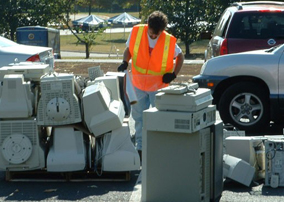Today we are talking to Matthew Buckley from Vanderbilt University. Matthew is the University’s Surplus Property Manager. Matthew was so generous with his time and expertise so that we could bring you his learnings and experience in setting up and running a surplus program across the University.
Vanderbilt University, located in Nashville, Tennessee, was founded in 1873 and named in honor of Cornelius Vanderbilt, the wealthiest man in the US at the time, who made a generous donation of $1 million (the equivalent of nearly $20 million today) to the school, despite having never been to the South. As this was one of the two philanthropist causes supported by the shipping and rail magnate, Vanderbilt hoped that his gift and the greater work of the university would help to heal the sectional wounds inflicted by the Civil War.

Today Vanderbilt University is a private research university that enrolls annually approximately 12,000 students from all 50 US states and over 90 foreign countries in four undergraduate and six graduate and professional schools. Several research centres and institutes are affiliated with the university, including the Vanderbilt Institute for Public Policy Studies, Freedom Forum First Amendment Center, Dyer Observatory, and Vanderbilt University Medical Center, the only Level I trauma center in Middle Tennessee.

The Vanderbilt University and the Medical Center worked as a single entity up until the end of April 2016, when they legally parted into two separate companies. The separation brought a lot of changes to the university, including the need of a Surplus Property Program, which was previously managed entirely by the hospital, as they had the higher volume of surplus items and equipment.
Matthew Buckley is the University’s Surplus Property Manager as of May 2016, and he also administers campus waste and recycling. He is responsible for the university’s traditional recycling of paper, plastic, aluminum and any other items, and also manages their waste services from the dumpster level to dealing with the vendor as the single point of contact for the university.
Ever since the university and hospital began operating independently, Matthew manages the Surplus Property Program in a couple different ways by collecting surplus items from campus and bringing it back to a central location where he determines their reusability. All items that are non-functional or not usable by someone else due to their condition are scrapped and recycled on site. On the other hand, the majority of usable surplus items are donated directly to Goodwill, a nationwide chain of thrift stores (retail stores).
By donating to Goodwill, Vanderbilt University shows they are not in the business of generating revenue from their surplus items, but rather show a strong social responsibility by helping fund job placement and workforce training programs. Aside from donating to Goodwill, Vanderbilt University also works with a vendor partner called Green Standards Limited, based out of Toronto Canada. This vendor donates for them and takes care of finding donation opportunities with other smaller organisations throughout their region. The organisations can be anything from other universities to drug centers, churches or schools, as long as they are registered as a not for profit.
According to Matthew, Vanderbilt is still struggling with setting up an efficient mechanism that will promote internal reuse of surplus items, within other departments of the University. They currently have a website where individuals can do free swapping and post things for free, but are looking to upgrade it and offer departments the possibility to post items before they would reach the Surplus Department.

With the exception of the off-campus observatory and satellite medical clinics, all of the university’s facilities are situated on its campus in the heart of Nashville. Due to its urban surroundings, the Surplus Department only has a small storage area of around 12,000 square feet, causing the need to dispose of any surplus items as soon as possible, within two weeks.
Aside from lacking storage room, Matthew is also struggling with finding the right people for their surplus items, who are willing to repair something if it doesn’t work completely in order to avoid scrapping it. Other items that turned out to be a challenge are cubicles, where they’re dealing with panels and separate pieces. Because the sets are not always complete, it’s hard to find someone who wants them, even if the panels and other pieces are in good shape.
The Vanderbilt Surplus Departments has only recently started its activity and due to lack of data from the previous program it was hard for Matthew to justify hiring more staff. Currently the only people responsible for the surplus program are him and his assistant, but he’s hoping to justify another staff member that would manage the program on a day to day basis. Based on data from the vendor regarding weight of items donated and their market value, Matthew wants to show the University the savings they’ve made based on their current waste disposal costs.
He said: “We’re certainly learning a little bit about what we can have because we didn’t have a very good grip or data on the types and volumes of items. These things were just not recorded by the previous program so we went into it a little bit blind, so we’re learning as we go.”

Matthew that was great thankyou!








